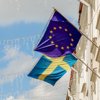Fritextsökning
Artiklar per år
Innehållstyper
-

New findings on the diseases that crushed Napoleon’s army
As if cold, starvation, and typhus weren’t enough. New research reveals that Napoleon’s defeated army also suffered from paratyphoid fever and relapsing fever during the retreat from Russia.
-

Canada approves leqembi as global alzheimer’s drug race heats up
Leqembi has secured approval in Canada, further consolidating its global lead among disease-modifying Alzheimer’s therapies. The antibody is now authorized in 15 major markets — one more than its closest rival, Eli Lilly’s Kisunla.
-

Swedish life science is growing – but capital is not keeping up
The number of employees and companies in Swedish life science is increasing and the sector is more equal than many other sectors. But investments in unlisted companies are weak.
-

A cluster contribution to European life science innovation and competitiveness?
-

How the Nobel discovery is used in drug development
Regulatory T cells keep the immune system in check, a discovery now awarded the 2025 Nobel Prize in Physiology or Medicine. Qiang Pan Hammarström explains how this finding is being applied in today’s drug development, and what challenges remain.
-

Sarah Lidé: ”Artificial intelligence must not replace authentic interactions”
Artificial intelligence must never become a replacement for authentic, even if messy, interactions with our fellow humankind, Sarah Lifé, Deputy CEO at Medicon Village Innovation, writes in a column.
-

Eva Bondesson blir ny klinisk chef på Neola
Neola Medical har rekryterat Eva Bondesson som ny Clinical Director.
-

Heart Monitoring in Breast Cancer – Essential or Excessive?
Trastuzumab and related drugs have transformed breast cancer treatment and dramatically improved survival rates. But the close cardiac monitoring required during treatment can be a heavy burden for both patients and healthcare systems. Dr. Andri Papakonstantinou is working to refine how doctors identify which patients truly need intensive follow-up.
-

Novo Nordisk tells staff to return to office
At the turn of the year, Novo Nordisk employees will no longer be able to work remotely. According to the company’s new CEO, the move is intended to accelerate decision-making and improve commercial execution as competition in the obesity drug market intensifies.
-

New ATMP center inaugurated: “In the future, we will see cell and gene therapies in all clinics”
Karolinska Institutet and Karolinska University Hospital’s new ATMP center was inaugurated in Flemingsberg, south of Stockholm. “The ATMP Center is not just a physical place, it is a promise,” said KI’s Vice-Chancellor Annika Östman Wernerson.
-

Neogap värvar tungt namn inom cellterapi
Bioteknikbolaget Neogap Therapeutics fyller på styrelsen med expertis inom cellterapi i form av professor Jonas Mattsson.
-

BMS and venture capital giant form new company
The American pharmaceutical company Bristol Myers Squibb, together with the venture capital firm Bain Capital, is forming a new biotech company. The company will develop treatments for autoimmune diseases where there is currently a lack of effective therapies.
-

CAR-T-terapin Carvykti rekommenderas i Sverige – behandling förbereds
Karolinska universitetssjukhuset har för första gången i Sverige inlett förberedelser för att behandla en patient med blodcancerformen multipelt myelom med CAR-T-cellsterapi i rutinsjukvården. Det efter att Johnson & Johnsons ATMP Carvykti officiellt rekommenderats i Sverige.
-

Ny professur ska driva forskning om obesitas
Men start 2026 instiftas en ny professur med fokus på metabolism och obesitas vid Sahlgrenska akademin. Totalt 200 miljoner kronor investeras i den tioåriga forskningssatsningen.
-

Agreement in the EU on eight years of data exclusivity for new medicines
New pharmaceuticals will be covered by eight years of data exclusivity, according to the proposed new pharmaceutical legislation that EU countries have now agreed upon after prolonged negotiations.
-

Mercks RSV-läkemedel får tummen upp i USA – tar upp kampen med Beyfortus
Amerikanska FDA godkänner Mercks nya läkemedel mot infektioner orsakade av RS-virus. Därmed får Sanofis och Astra Zenecas storsäljare Beyfortus ny konkurrens.
-

The race between new alzheimer’s drugs Kisunla and Leqembi heats up
Kisunla or Leqembi? The rivalry between Eli Lilly and Bioarctic is intensifying. Where one drug gains approval, the other falls behind. Here's a look at the markets where these competing treatments are currently available.
-

The scientist behind Novo Nordisk's obesity success: “I never stopped believing in GLP-1”
It took several years of failures in GLP-1 before Lotte Bjerre Knudsen and her colleagues found the right path – but when they did, it was a true breakthrough. "We invested for 25 years while everyone else laughed at us. Now everyone wants to join the game," says Lotte Bjerre Knudsen, Chief Scientific Advisor at Novo Nordisk.
-

Elyptas cancertest ska prövas i EU-projekt kring Lynchs syndrom
Det svenska diagnostikbolaget Elypta ska delta i ett stort europeiskt projekt för att möjliggöra tidig upptäckt av cancer hos personer med Lynch syndrom.
-

Trump in new push to lower drug prices
U.S. President Donald Trump announced on Sunday that he plans to sign an executive order to lower the cost of prescription drugs to the same levels paid in other wealthy countries — something he claims could reduce prices by 30 to 80 percent.
-

Rovtidskriftsjägaren om sin ärkefiende: ”Ondskans imperium”
Han myntade begreppet rovtidskrifter och gjorde ett första försök att kartlägga deras utbredning. Nu berättar bibliotekarien Jeffrey Beall om konsekvenserna det fick för honom. Det här är del fyra i Life Science Swedens artikelserie om rovtidskrifter.
-

Getinge and Neobiomics received Swecare's export awards
Two companies received awards during Swecare's annual conference.
-

De fick Swecares exportpris
Två företag mottog priser under Swecares årskonferens.
-

Mikael Kubista back with new venture after turbulent exit
Entrepreneur and researcher Mikael Kubista is starting a new company. Now he is also free to comment on the sequence of events that led to him losing ownership of his life's work – the company Tataa Biocenter. “Not only did they take our company away from us. They followed up by showering us with lawsuits,” he says.